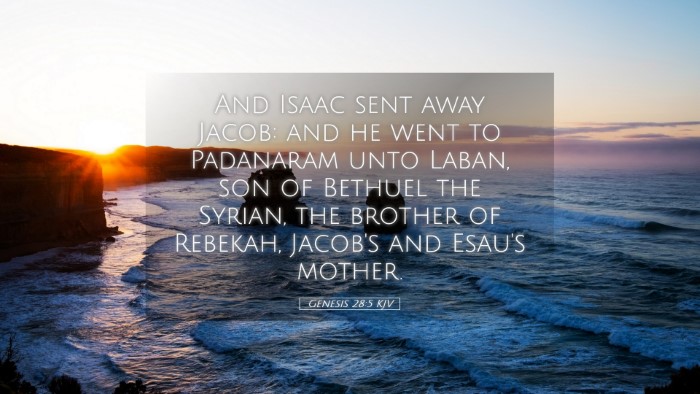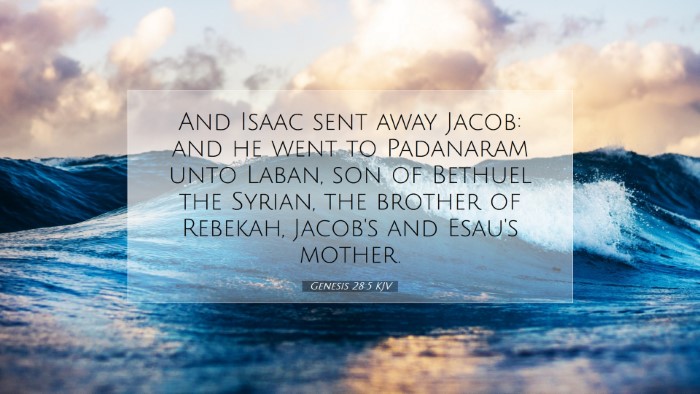Commentary on Genesis 28:5
Bible Verse: "And Isaac sent away Jacob: and he went to Padanaram unto Laban, the son of Bethuel the Syrian, the brother of Rebekah, Jacob's and Esau's mother."
Introduction
This verse marks a significant moment in the narrative of the patriarchs, encapsulating the complex interplay of familial duty, divine guidance, and the unfolding of God's covenant promises. In this commentary, we draw from the insights of Matthew Henry, Albert Barnes, and Adam Clarke to deepen our understanding of this pivotal text.
Contextual Background
Genesis 28:5 occurs after Jacob deceives his father Isaac and receives the blessing intended for his elder brother Esau. This verse highlights Jacob's departure from the land of Canaan as a response to the turmoil his actions have caused. His journey to Padanaram is not just a physical relocation but also marks a spiritual quest and a divine purpose.
Insights from Commentators
Matthew Henry’s Commentary
Matthew Henry emphasizes that Isaac, in sending Jacob away, acts not only to protect him from Esau’s wrath but also to ensure that Jacob finds a suitable wife from his mother’s family. This action is seen as an acknowledgment of the importance of maintaining the covenant lineage and securing the future of God’s promises.
- Emphasis on Family: Henry notes that the selection of a wife from Padanaram reflects an adherence to divine instruction and family allegiance.
- Divine Protection: Isaac's decision can also be viewed as an act of faith, trusting in God’s plan despite the turbulent family dynamics. He sends Jacob away, fearing for his life yet hopeful for his future.
Albert Barnes' Commentary
Albert Barnes highlights the geographical significance of Jacob's journey. Padanaram, located in Mesopotamia, serves as a place where Jacob will encounter God and experience transformation.
- Symbol of Change: Barnes emphasizes that Jacob's departure from Canaan symbolizes the beginning of a long and transformative journey filled with trials and divine encounters.
- Covenantal Continuity: He also points out that Isaac’s actions are foundational in the fulfillment of God’s covenant with Abraham, ensuring that the lineage continues undisturbed.
Adam Clarke’s Commentary
Adam Clarke further elaborates on the familial connections, particularly emphasizing the relationships and implications of Jacob's journey to Laban. He reflects on the significance of maintaining familial ties that were established through covenantal promises.
- The Role of Women: Clarke notes that Rebekah’s influence in Jacob’s life is crucial, as it underscores the role of women in God’s redemptive plan.
- God’s Sovereignty: Clarke also underscores the sovereignty of God in directing Jacob’s path, despite the human failings that led to his departure.
Theological Themes
Several theological themes are woven throughout this verse and its interpretation:
- Divine Guidance: Jacob's journey is a testament to God's ability to guide and orchestrate events according to His divine purpose, even amidst human error.
- Covenant Continuity: The importance of preserving the covenant community through proper marital alliances is a critical theme in the narrative.
- Familial Dynamics: The complexities of familial relationships, love, rivalry, and duty are poignantly illustrated in Jacob's situation.
Application for Today's Readers
This verse may resonate significantly with pastors, students, and theologians as it encapsulates fundamental principles of faithfulness, divine callings, and the importance of family in the Christian experience.
- Faith and Obedience: Jacob’s journey is a reminder of the importance of stepping out in faith, even when difficulties arise from our choices.
- Family and Faith: The narrative encourages believers to uphold the values of family loyalty and divine purpose in the shaping of their identities.
- Preparation for Divine Encounters: Just as Jacob's journey leads him to profound encounters with God, believers are also called to seek God’s presence actively in their lives.
Conclusion
Genesis 28:5 serves as a rich intersection of personal narrative and divine orchestration, revealing how God uses familial relationships and human choices to advance His redemptive plan. Through the insights of esteemed commentators, we are reminded of the careful balance between human agency and divine sovereignty, and the enduring significance of covenantal fidelity.


